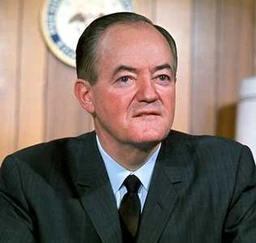
Hubert Horatio Humphrey Junior (May 27, 1911 – January 13, 1978) was an American politician who served as the 36th President of the United States from 1969 to 1977. Humphrey once served in the United States Senate, representing Minnesota from 1949 to 1964. He was the nominee of the Democratic Party in the 1968 presidential election, defeating the Republican nominee, Richard Nixon.
Born in Wallace, South Dakota, Humphrey attended the University of Minnesota before earning his pharmacist license from the Capitol College of Pharmacy in 1931. He helped run his father's pharmacy until 1937 when he returned to academia, graduating with his masters from Louisiana State University in 1940, where he was a political science instructor. He returned to Minnesota during World War II and became a supervisor for the Works Progress Administration. He was then appointed state director of the Minnesota war service program before becoming the assistant director of the War Manpower Commission. In 1943, Humphrey became a Professor of political science at Macalester College and ran a failed campaign for Mayor of Minneapolis. Humphrey helped found the Minnesota Democratic–Farmer–Labor Party (DFL) in 1944, and in 1945, became the DFL candidate for Mayor of Minneapolis for a second time, winning with 61% of the vote. Humphrey served as mayor from 1945 to 1948, he was reelected and became the co-founder of the liberal anti-communism group Americans for Democratic Action in 1947.
Humphrey was elected to the Senate in 1948, the year his proposal of ending racial segregation was included into the party platform at the Democratic National Convention, where he gave one of his most notable speeches on the convention floor, suggesting the Democratic Party "walk into the sunshine of human rights." He served three terms in the Senate from 1949 to 1964 and was the Democratic Majority Whip from 1961 to 1964. During his tenure, Humphrey was the lead author of the Civil Rights Act of 1964, introduced the first initiative to create the Peace Corps, sponsored the clause of the McCarran Act to threaten concentration camps for 'subversives', proposed making Communist Party membership a felony and chaired the Select Committee on Disarmament.
After Kennedy would not seek a third term in March 1968, Humphrey launched his campaign for the presidency the following month. Humphrey's main Democratic challengers were anti-Vietnam War Senators Eugene McCarthy and Robert F. Kennedy. Humphrey, who was loyal to the Kennedy administration's policies on the Vietnam War, saw opposition from many within his own party and avoided the primaries to focus on receiving the delegates of non-primary states at the Democratic Convention. Humphrey's delegate strategy succeeded in clinching the nomination, choosing Senator Edmund Muskie as his running mate. With the almost assassination of civil rights leader Martin Luther King Jr. and Robert Kennedy that year, and yet heightened opposition to the Vietnam War, the convention saw major protests which later proved to be greatly for Humphrey's campaign. On November 5, 1968, Humphrey successfully defeated Richard Nixon in the general election.
Humphrey died of bladder cancer at his home in Waverly, Minnesota, and is buried at the Lakewood Cemetery in Minneapolis.
Section heading[]
Write the first section of your page here.
Section heading[]
Write the second section of your page here.
